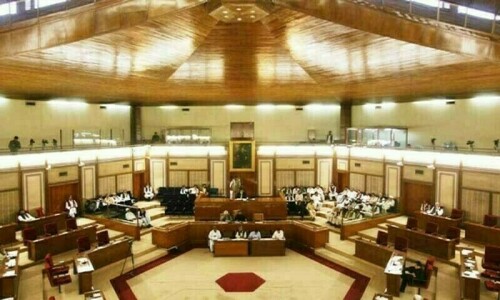
BRUSSELS: Nato opens a new chapter in its history this week when it maps out an end to the combat mission in Afghanistan and draws lessons from the costly war to help shape its vision for the next decade.
Leaders from the military alliance meet in Lisbon on Friday and Saturday to endorse a high-stakes plan to start handing over security responsibility to Afghan forces in early 2011 with the aim of giving them the lead by 2014.
Nato will take another key decision that will guide it through the next 10 years with the adoption of a new “strategic concept” to face 21st century threats such as terrorism, ballistic missiles and cyber attacks.
The alliance is also expected to agree on a missile shield for Europe and invite Russia to join the system during a separate summit that will mark a major thaw in strained relations between the former Cold War rivals.
“I am confident this will be one of the most important summits in Nato’s history,” Nato Secretary General Anders Fogh Rasmussen said this week.
The war in Afghanistan, launched in the wake of the September 11, 2001 attacks on the United States, will cast a shadow over the summit after a nine-year campaign that has cost the lives of 2,200 foreign soldiers.
“While Nato emerged victorious from the Cold War — without firing a single shot — and from its Balkans interventions, alliance fortunes in Afghanistan seem decidedly more mixed,” wrote Steven Pifer and Justin Vaisse of the Brookings Institution think-tank in Washington.
The United States poured tens of thousands of extra troops into the conflict this year to counter a resilient Taliban insurgency, bringing the number of foreign troops to 150,000.
Afghan President Hamid Karzai, who will attend the summit, surprised the alliance this week by calling for a reduction in night raids by US forces and a lighter military footprint to pare down “intrusiveness” in daily Afghan life.
The escalation of the war has resulted in the bloodiest year for the alliance, with nearly 650 troops killed this year, amid waning public support for the conflict among allied nations.
The Netherlands ended its combat mission this year while Canada said it would switch to a training mission next year with 950 military trainers.
Nato wants allies to send more police and military trainers to prepare Afghan forces, plagued by high attrition rates, to take over the combat lead nationwide by 2014.
Critics warn that the transition policy could embolden insurgents and make allies question Washington’s resolve.
“The president’s emphasis on ‘transition,’ intended to convey progress through the transfer of responsibility and burden to the Afghan government, does not convey a commitment to win,” said Ian Brzezinski, who was a senior defence official under president George W. Bush.
“It is inescapably imbued with the odor of withdrawal, if not retreat,” he wrote in the International Herald Tribune.
But Nato is expected to strike a long-term partnership deal with Afghanistan that would show the alliance’s commitment to the country beyond 2014.
“We need to reassure them that our idea of transition is not abandonment,” said a senior Nato official.
Rasmussen acknowledged last month that the alliance made a “mistake” by waiting until 2008 to set up its training mission in Afghanistan and had to learn lessons that were taught “at a very high price” by the war.
The strategic concept will likely call for a “comprehensive approach” to future conflicts, with an emphasis on coordination between the political, military and civilian spheres, Rasmussen said.
The once-in-a-decade mission statement is to replace the post-Cold War concept that was written in 1999, two years before the September 11 attacks redefined the threat and before the alliance expanded to 28 members.
The 11-page text is expected to reaffirm the alliance’s commitment to collective defence, a one-for-all and all-for-one philosophy.
But it will also chart a more modern Nato to counter 21st century threats and call for deeper partnerships with long-standing allies such as Australia, South Korean and Japan.










































Dear visitor, the comments section is undergoing an overhaul and will return soon.